Portal:Tropical cyclones/Anniversaries/February
Appearance
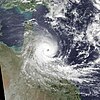
February 1
- 1986 - Cyclone Winifred (pictured) hit Innisfail, Queensland, causing extensive damage and killing three people.
- 2009 - Cyclone Ellie makes landfall as a Category 1 tropical cyclone near Mission Beach, Queensland. About 50 homes were flooded, and damages were up to AU$110 million (US$69.5 million).
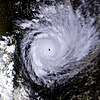
February 2
- 1968 - Cyclone Georgette dissipated after being active for 24 days in the south-west Indian Ocean, the longest tracked storm in the basin. The storm killed 32 people along its path.
- 1994 - Cyclone Geralda (pictured) struck eastern Madagascar as one of the strongest tropical cyclones to hit the island since 1925. Geralda killed 231 people.
- 2013 - Cyclone Iggy made landfall near Jurien Bay, Western Australia. Iggy's precursor killed 16 people in Indonesia.

February 3
- 1952 - A tropical storm formed east of Florida, becoming the only Atlantic tropical cyclone on record in the month of February.
- 1990 - Cyclone Ofa passed near the Samoan Islands near peak intensity, causing heavy damage and eight deaths across Polynesia.
- 2011 - Cyclone Yasi (pictured) makes landfall in northern Queensland. Despite killing only one person, the storm ended up being the costliest tropical cyclone in the Australian basin, with damages topping up to US$3.6 billion.

February 4
- 1986 - Cyclone Erinesta (pictured) reached peak intensity near Tromelin Island in the south-west Indian Ocean, with estimated 10-minute sustained winds of 170 km/h (105 mph).
- 2002 - Cyclone Francesca reached peak intensity with 1-minute sustained winds of 215 km/h (130 mph).
- 2010 - Cyclone Oli moved through French Polynesia, where it killed one person and left US$70 million in damage.

February 5
- 1977 - Cyclone Emilie moved ashore Mozambique, where flooding killed about 300 people.
- 2002 - Cyclone Chris (pictured) reached its peak intensity with 230 km/h (145 mph) winds before making landfall in a sparsely populated area of Western Australia.

February 6
- 2003 - Cyclone Beni (pictured) impacted the Queensland coast as a weakening system. Beni caused heavy flooding in Central Queensland that killed one person and caused $10 million of damage.

February 7
- 2005 - Cyclone Harvey made landfall on the Queensland-Northern Territory border as a Category 3 cyclone but caused only minor damage.
- 2009 - Cyclone Gael (pictured) reaches peak strength as an intense tropical cyclone off the coast of Madagascar. Only 2 people were killed by the cyclone.

February 8
- 2020 - Cyclone Damien made landfall over Western Australia bringing gusty winds and flooding.
- 2021 - Cyclone Faraji (pictured) attained peak 10 minute winds of 230 mph (145 km/h) in the southern Indian Ocean.

February 9
- 2003 - Cyclone Dovi (pictured) reached its peak intensity with winds of 240 km/h (150 mph) in the open Pacific Ocean. Dovi did not affect any land.
- 2014 - Tropical Low Fletcher makes its second landfall in Burketown, Queensland. Fletcher is known to be the fourth wettest tropical cyclone in Australia, with recorded precipitation of 1,246.8 mm (29.48 in).
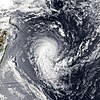
February 10
- 1994 - Cyclone Hollanda (pictured) struck Mauritius in the south-west Indian Ocean, killing two people and leaving 1,500 people homeless.
- 2015 - Typhoon Higos attained its peak intensity with 1-minute sustained winds of 215 km/h (130 mph), becoming the easternmost, and second strongest storm in the month of February in the Northwest Pacific ocean.
- 2019 - Cyclone Gelena passed by the archipelago of Mauritius as an intense tropical cyclone. Overall damage on the island were about US$1 million.
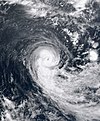
February 11
- 2020 - Cyclone Uesi (pictured) reached its peak intensity of 130 km/h (80 mph) near New Caledonia.

February 12
- 2003 - Four tropical cyclones (pictured) were simultaneously active in the central Indian Ocean. The storms, from left to right, were: Cyclone Gerry, Cyclone Hape, the precursor to Tropical Storm Isha and Cyclone Fiona.
- 2018 - Cyclone Gita became the strongest tropical cyclone on record to strike Tonga, where it killed two people.
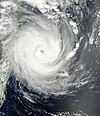
February 13
- 2006 - Cyclone Vaianu reached its peak intensity with a central pressure of 965 hPa (mbar). Vaianu caused flooding in Tonga.
- 2012 - Cyclone Giovanna (pictured) moved ashore eastern Madagascar, killing 35 people in the country.
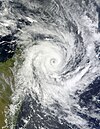
February 14
- 1981 - Cyclone Cliff hit Queensland, Australia after affecting several Pacific islands. One person died in Australia.
- 2011 - Cyclone Bingiza (pictured) made landfall in Madagascar and kills a total of 34.
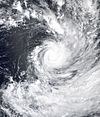
February 15
- 2005 – Cyclone Nancy (pictured) moved through the Cook Islands in the South Pacific Ocean, the second of four powerful cyclones to affect the archipelago.
- 2010 – Cyclone Dineo struck southern Mozambique, killing 280 people across southeastern Africa.

February 16
- 2005 - Cyclone Olaf (pictured) reached its peak intensity with winds of 270 km/h (165 mph) to the northeast of American Samoa. Olaf caused over $10 million of damage on the islands.
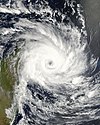
February 17
- 1991 - Cyclone Cynthia struck southwestern Madagascar, killing 36 people.
- 1996 - Cyclone Doloresse moved through the Comoros, causing a shipwreck that killed 67 people.
- 2008 - Cyclone Ivan (pictured) made landfall on Madagascar, causing 93 deaths and heavy damage.

February 18
- 2002 - Cyclone Guillaume (pictured) reached peak intensity of 205 km/h (125 mph) by 10-minute sustained winds.

February 19
- 2015 - Cyclones Lam and Marcia (both pictured) struck different parts of Australia, marking the first time on record that two storms of Category 4 intensity struck the country on the same day. Lam moved ashore Northern Australia, causing widespread flooding. Six hours later, Marcia made landfall on Queensland as a Category 5 severe tropical cyclone.

February 20
- 1954 - The 1954 Gold Coast cyclone made landfall to the north of Brisbane. The storm claimed 26 lives throughout the Gold Coast.
- 2016 - Cyclone Winston (pictured) became the most intense Southern Hemisphere tropical cyclone on record while making landfall in Fiji, killing 44 people.

February 21
- 1984 - Cyclone Bobby reached its peak intensity with a pressure of 950 hPa (mbar) as it skirted to the north of the Western Australia coast.
- 2013 - Tropical Storm Shanshan (pictured) intensifies into a tropical storm, whilst the storm damages ₱11.2 million (US$255 thousand) in southern Philippines.
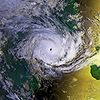
February 22
- 1931 - A powerful cyclone struck Fiji, killing 225 people.
- 2000 - Cyclone Leon–Eline (pictured) hit southern Mozambique with 215 km/h (130 mph) winds after crossing the width of the Indian Ocean. Eline killed up to 1,000 people in Mozambique and Madagascar.
- 2007 - Cyclone Favio struck southern Mozambique, causing 11 fatalities.

February 23
- 2019 - Typhoon Wutip (pictured) reached its peak intensity with 1-minute sustained winds of 270 km/h (165 mph), making it the strongest typhoon on record in the month of February.
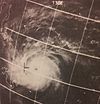
February 24
- 1970 - Typhoon Nancy (pictured) reached peak intensity as a Category 4 typhoon, which is one of a very few storms to achieve typhoon category in the month of February.
- 1995 - Cyclone Bobby hit Western Australia near Onslow, causing over 400 mm (15 in) of rain in the town. There were eight deaths related to Bobby.
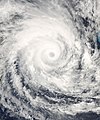
February 25
- 2007 - Cyclone Gamede (pictured) dropped 1,625 mm (64.0 in) of rainfall over a 24 hour period on Réunion in the south-west Indian Ocean, part of a nine-day precipitation total of 5.5 m (18 ft). Floods caused US$120 million in damage and four deaths.

February 26
- 2004 - Cyclone Ivy moved through Vanuatu in the South Pacific Ocean near peak intensity, with 10 minute winds of 165 km/h (105 mph). Ivy killed two people in the country.
- 2013 - Cyclone Rusty (pictured) reached peak intensity as it stalled offshore Western Australia, moving ashore a day later. Rusty caused US$510 million in damage.
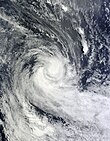
February 27
- 1960 - Cyclone Carol struck Mauritius, killing 40 people and leaving heavy damage.
- 2014 - Cyclone Kofi (pictured) moved through Fiji, causing flooding.
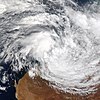
February 28
- 1962 - Cyclone Jenny moved through the Mascarene Islands, killing 53 people.
- 2003 - Cyclone Graham (pictured) makes landfall over Western Australia as a Category 2 tropical cyclone.
- 2006 - Cyclone Emma made landfall on the coast of Western Australia. Emma caused severe floods throughout the Pilbara region of Western Australia.

February 29
- 1984 - Cyclone Chloe made landfall near Roebourne, Western Australia at its peak intensity with winds of 140 km/h (65 mph).
- 2004 - Cyclone Monty (pictured) reached peak strength before making landfall over in the Pilbara coast.
